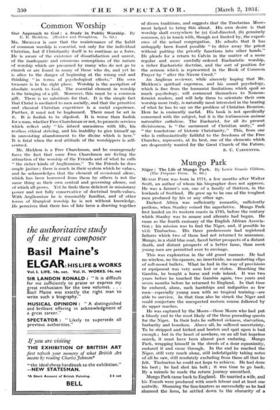Common Warship
Mit. MICKLEM is sure that the maintenance of the habit of common worship is essential, not only for the individual Christian, but if Christianity itself is to continue as a force. He is aware of the existence of dissatisfaction and unrest, of the inadequate and erroneous conceptions of the nature of worship which arc presumed by many who do not go to church or are found in many of those who do, and yet he is alive to the danger of beginning at the wrong end and thinking " in terms of psychological effects." His o►+n treasure is in the right place. Worship is the ascription of absolute worth to God. The essential element in worship is the bringing of a gift. Moreover, this must be a common gift. There is no substitute for that. It is the simple fact that Christ is mediated to men socially, and that the primitive and classical Christian experience is a social experience. Further, it must not be haphazard. There must be art in it. It is foolish to be slipshod. It is worse than foolish for a man, whether Free Churchman or not, to promote services which reflect only " his inbred uneasiness with life, his restless ethical striving, and his inability to give himself up in unresisting abandonment to the divine which is here." It is fatal when the real attitude of the worshippers is self- centred.
Mr. Micklem is a Free Churchman, and he courageously faces the fact that some Free Churchmen are feeling the attraction of the worship of the Friends and of what he calls " the richer kinds of Anglicanism." To the Friends he does ample justice ; there is much in their system which he values, and he acknowledges that the element of occasional silene, which has been borrowed from them by others is not the same thing as their own central and governing silence, out of which all grows. Yet he finds them deficient in missionary power and not fully conservative of doctrinal truth-values. . With Anglicanism he is reasonably familiar, and of other forms of liturgical worship he is not without knowledge. He perceives that there has of late been a drawing together
of divers traditions, and suggests that the Tractarian Move- ment helped to bring this about. His own desire is that worship shall everywhere be (a) God-directed, (b) genuinely common, (c) in touch with, though not limited by, the experi- ence of the actual congregation. He admits that it has unhappily been found possible " to drive away the priest without putting the priestly functions into other hands." He pleads for a return to Calvin in the matter of a more regular and more carefully ordered Eucharistic worship, a richer Eucharistic doctrine, and the sort of position for the sermon which is represented in the Book of Common Prayer by " after the Nicene Creed."
An Anglican reviewer, while sincerely hoping that Mr. Micklem's spiritual eagerness, and his sound psychology, which is free from the humanist limitations which spoil so much psychology, will commend themselves to Noncon- formist readers, and will help them to orientate their own worship more truly, is naturally most interested in the bearing of what he has to say on the problem of Christian Reunion. Here he is eminently useful. His book is not specifically concerned with the subject, but it is the testimonium animas naturaliter catholicae. The Eucharist, for all its present divisiveness, is " the sacrament of Christian unity," and " the touchstone of historic Christianity." This, from one who is enthusiastically faithful to the freedoms of the Free Churches, represents, at its best, one of the elements which are desperately wanted for the Great Church of the Future.
S. C. CARPENTER.




























































 Previous page
Previous page